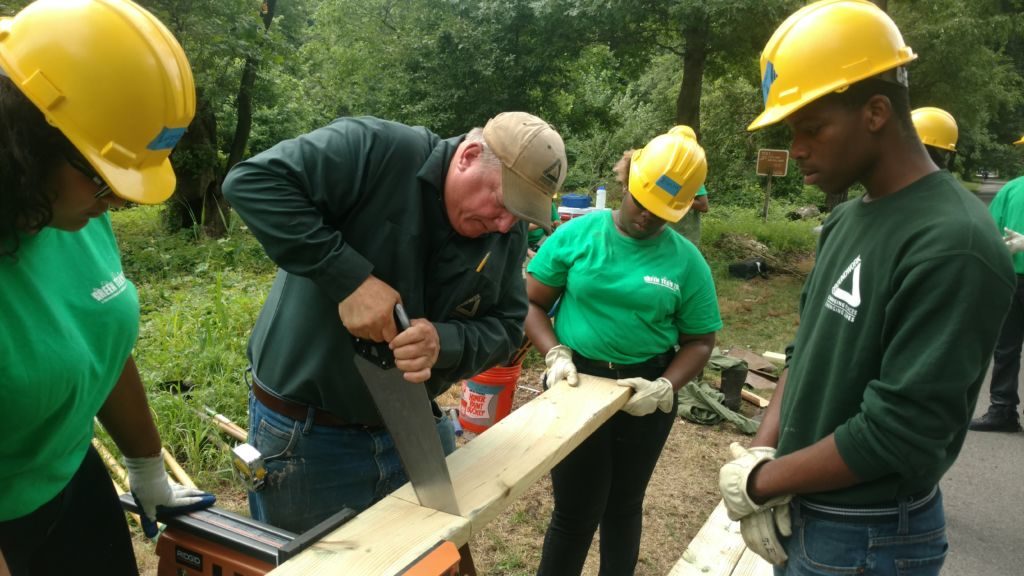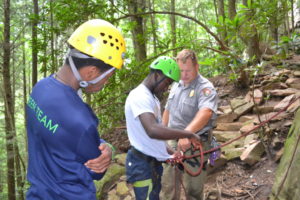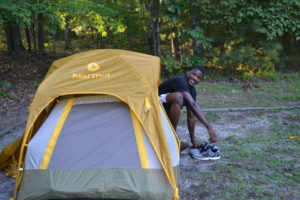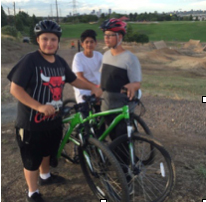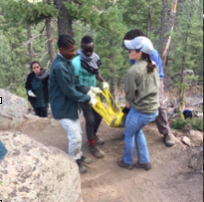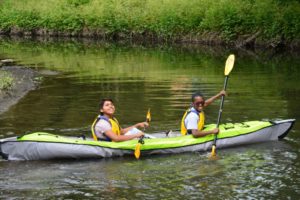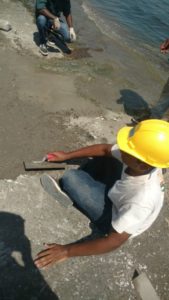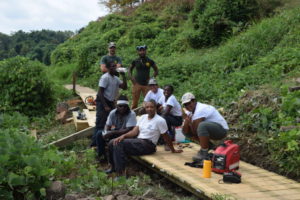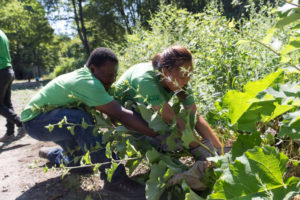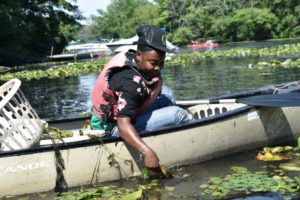Green Teams Perform Service Learning Projects
Service learning is a powerful tool for connecting people and their communities to local parks and natural areas. To celebrate the centennial of the National Park Service, the REI Foundation partnered with the National Park Foundation to fund projects that introduce underserved, inner-city youth to their nearby national parks and engage them in service projects to improve them. The project purpose is to foster stewardship among participants, help them to discover opportunities for outdoor recreation, and instill the value of nature and our nations’ parks—both national and local.
“A key component to these projects was to improve access to outdoor recreation, a key issue that hinders disadvantaged urban populations from engaging in recreation. Three major accomplishments were completed under the terms of this grant: helping disadvantaged youth learn new ways to recreate such as kayaking, showing them how to find access to recreation sites, and third, to build new recreation access facilities near their neighborhoods.”
–Curt Collier, Youth Program Director, Groundwork USA
Groundwork USA was awarded funds to support five Groundwork Trusts’ Green Teams across the country. Green Team participants are high-school aged youth that are paid to work together as a team, complete urban environmental restoration projects, and receive extensive job training. With the help of REI and the National Park Foundation, these projects allowed the youth to experience national parks for the first time and learn new ways of recreating in the outdoors, all while getting the Groundwork Green Team experience.
Cincinnati, OH
Groundwork Cincinnati hired twelve youth for service learning in the Big South Fork National River and Recreation Area. Participants learned about careers within the National Park Service by working on trails, performing basic park maintenance, and interviewing park employees. This experience allowed them to connect their work to larger scale conservation efforts, including ongoing projects in urban areas. By participating in recreation activities such as rock climbing, hiking, camping, swimming, and fishing, the youth brought home ideas for outdoor recreation in their own neighborhoods.
Denver, CO
For Groundwork Denver/Groundwork Colorado, the National Park Foundation and REI were the catalysts to connect Denver’s youth to the outdoors. Over seventy youth were employed and worked diligently to complete trail building, historical preservation, fire mitigation, habitat restoration, and environmental education projects in natural areas from urban back yards to the high peaks of the Rocky Mountains, including Rocky Mountain National Park. GW Denver/GW Colorado also strengthened partnerships with the Colorado Mountain Bike Association, Westwood Unidos, Denver Parks and Recreation, Colorado History Museum, United States Forest Service, and Colorado Parks and Wildlife as part of this work.
“Urban youth are disproportionately disconnected from nature. We protect what we love. Representing the changing face of America’s future in the environment and conservation is a mission with purpose. People love nature. Everyone deserves a right to learn how they love nature.” – Groundwork Denver
Yonkers, NY
Groundwork Hudson Valley’s goal for this project was to connect urban residents, specifically youth, to kayaking by increasing access on nearby rivers. To accomplish this, twelve youth were hired to improve a kayak facility at Gateway National Recreation Area by resurfacing the ramp with concrete; a second project entailed building and installing a kayak launch on the Saw Mill River in Yonkers. Grant funding allowed GWHV to purchase kayaks for immediate and long-term use by youth. Youth discovered the beauty of kayaking both the Wallkill River National Wildlife Refuge and the Delaware River National Recreation Area.
Richmond, VA
Groundwork RVA introduced ten youth to river recreation and trail building with a weeklong excursion to the New River Gorge National River (NRGNR) in West Virginia. In that week, the youth built one mile of a new multi-use trail that ties into the fifteen-mile Garden Ground Trail System. For most of the participants, this trip included many firsts: the first time visiting a national park, first time in the New River, and first time performing Tai Chi thanks to the programming at NRGNR. The youth returned to Richmond to apply their newfound trail-building skills to construct 150 feet of boardwalk at the James River Park system.
Somerville, MA
Twenty-two youth hired by Groundwork Somerville removed 7,678 pounds of invasive water chestnuts from the Mystic River and participated in a multi-day service learning camping trip on Peddocks Island, which is part of the Boston Harbor Islands. While on the island, the youth learned more about invasive plants, leave-no-trace principles, and safe boating practices for recreation. They also received training on trail and camp site maintenance from National Park Service staff to round out their service learning experience. GW Somerville also planned a Canoemobile event, where 400 elementary school students canoed on the Mystic River and learned about water quality and ecosystem restoration on the water and at stations back on shore.
Impact and Lasting Impressions
Because of the grant from REI and the National Park Foundation, the Groundwork trusts were able to improve and expand the Green Team model by integrating outdoor recreation with existing educational programs. The addition of outdoor recreation facilitated the building of relationships with local REI stores and the National Park Service, provided additional job training skills to the participants, and made the experience even more memorable for participants. Previously, outdoor recreation was a minor component of Green Teams, but introducing youth to activities such as camping, boating, kayaking, and rock climbing took the participants’ experience to a whole new level. For GW Somerville, the participants rated the camping trip and service projects at the Boston Harbor Islands higher than all of the other projects in which they and their peers had participated over several years.
The outdoor recreation component adds far more than just fun playtime after a day’s work. Iyah Brown, a participant in GW Cincinnati’s Green Team, described her experience at Big South Fork National River and Recreation Area: “I found out things about myself that otherwise I wouldn’t had known I even had the ability or courage to do… I learned that I’m not afraid. I had just never put myself in a situation to find out… Overall this trip has helped me grow confidence, maturity, and social skills.”
The combination of job skills training and outdoor recreation ensures that the impact of the experience will make participants more competitive for conservation jobs, but also create lifelong stewards of the land because of the connections they built through hands-on work and recreation.
Sources and Further Reading
The REI Foundation Announces Historic Investment in the Next Generation of Outdoor Stewards to Celebrate the National Park Service Centennial. REI Co-op News Room, April 18, 2016.

